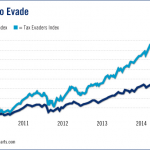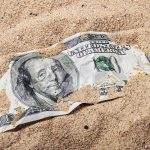Are the World’s Biggest Tax Havens Really Havens?
The man on that sandy $100 bill is the source of many proverbs. You probably know this one:
“In this world nothing can be said to be certain, except death and taxes.”
Now, almost 250 years after the revolution he helped start, the U.S. is proving Benjamin Franklin right. This being an election year, taxes – and who’s paying their fair share of them – are a hot-button issue.
U.S.-based businesses must pay a sizable corporate tax rate of 35%.
And believe it or not, that’s low compared to some other parts of the developed world. As a result, global tax havens have become popular destinations for companies.
But in this age of transparency, it’s getting harder and harder to be a tax shelter. The financial world was rocked by the Panama Papers revelations last spring. Apple (Nasdaq: AAPL) is currently facing a scandal over its tax-avoiding practices in Ireland.
This all begs an important question for investors…
Which tax haven is going to be exposed next?
It Pays to Evade
Of course, you may be asking, “Why should I even care? Isn’t tax inversion ‘unpatriotic’?”
Unpatriotic or not, there’s a proven difference in the performance of companies that invert versus the broad market.
In 2014, Fortune released a list of the top 28 tax-inverting companies. Here’s how they performed against the S&P 500.
biggest tax havens
So whether you agree or not, it’s important to know what’s going on with the world’s tax havens.
We’re examining four of the biggest destinations for evaders below. Which banks are sheltering money there? And how likely are they to get busted by a leak or government crackdown?
Let’s take a look…biggest tax havens
Switzerland
We’ll start with the obvious one. Switzerland has a long history of valuing corporations’ privacy and autonomy. It’s no wonder that the nation has some of the world’s strictest banking secrecy laws.
As a result, Switzerland is home to some of the world’s largest banks, including UBS (NYSE: UBS) and Credit Suisse (NYSE: CS).
The main threat to Swiss tax sheltering is pressure from the European Union. It has urged the Swiss government to share tax information more freely with its neighbors. The EU also wants it to adopt similar financial tax policies to the rest of Europe.
And in response, the Swiss have made some concessions to Brussels. In 2005, they began charging a withholding tax on interest from European-owned accounts.
But on a larger scale, Switzerland seems determined to protect its traditions of financial privacy. It has rejected information-sharing parts of the OECD financial standard. And it remains opposed to adopting the EU’s tax regime.
British Overseas Territories
The U.K. never let go of some of its Caribbean colonies. Bermuda and the Cayman Islands remain under the authority of the British crown. Of course, nowadays, it doesn’t directly control the economic activity of its overseas holdings.
The Cayman Islands and Bermuda are home to main offices for many international banks, including HSBC (NYSE: HSBC) and Deutsche Bank (NYSE: DB). They also have relaxed corporate registry laws. Because of this, thousands of multinational firms have quietly located subsidiaries in these islands.
The Obama administration has been very critical of the Cayman Islands tax policy. However, a 2005 report by the IMF lauded the islands’ regulatory system for banks. According to these international observers, Washington’s fears about dark money in the Cayman Islands are unfounded.
Monaco
This microstate of 36,000 people isn’t just a playground for the ultra-rich. It’s also a piggybank for the ultra-rich.
Monegasque tax policy is among the most lenient in the world. It hasn’t collected a cent of income tax since 1869. It also has a low corporate tax rate. Businesses in Monaco are taxed between 0% and 33%, depending on how much of their profits are generated in Monaco. These items combined make great conditions for offshore tax sheltering.
Monaco is home to many bank offices, including the Safra and Rothschild groups. However, the principality is also an EU member. As such, it’s subject to the EU’s financial regulations – and it participates in the Value Added Tax regime. So it does not enjoy the same degree of financial liberties as many of the other tax havens listed here.
United States
That’s right. It may feel like we have too many taxes back home. (Maybe we do.) But compared to most of Europe, our regulatory regime is quite lax.
For one thing, the U.S. is one of the biggest holdouts against the OECD’s Common Reporting Standard. The CRS is an international agreement which holds members to strict disclosure requirements. It mandates automatic information exchanges for accounts belonging to international customers.
The U.S. isn’t playing ball with these regulations because we value financial privacy more than we value other countries’ tax laws. That’s a good thing for both international and domestic investors. And it’s brought a lot of money and businesses to our shores.
If you want to read more on the subject, Sean Brodrick made the case for America as an international tax haven here.
As investors, it’s not for us to judge whether corporate tax inversion or the mere existence of tax havens is wrong. (You can feel free to make your opinion known as a voter in the upcoming election.) But you should keep a close eye on investments that are working to lessen the amount they pay Uncle Sam.
Like it or not, these firms have a history of outperforming the broad market.
IMAGES:
Biggest tax havens – sandy $100 bill
It pays to evade
Top tax havens
For more on this story go to: http://www.investmentu.com/article/detail/51601/are-biggest-tax-havens-really-safe#.V9gMsRS0Kaw








